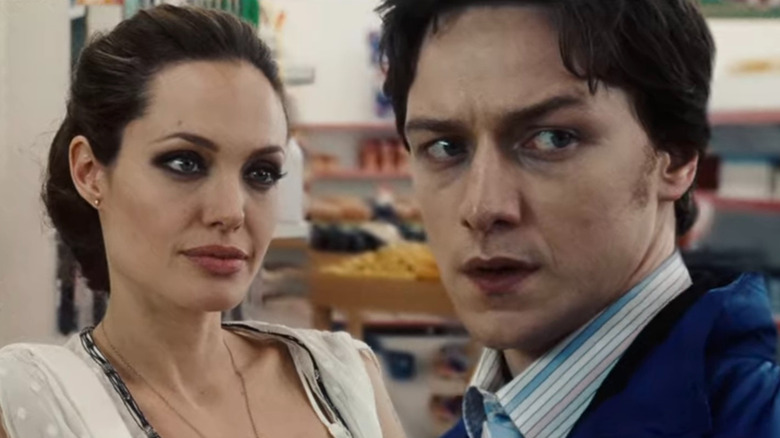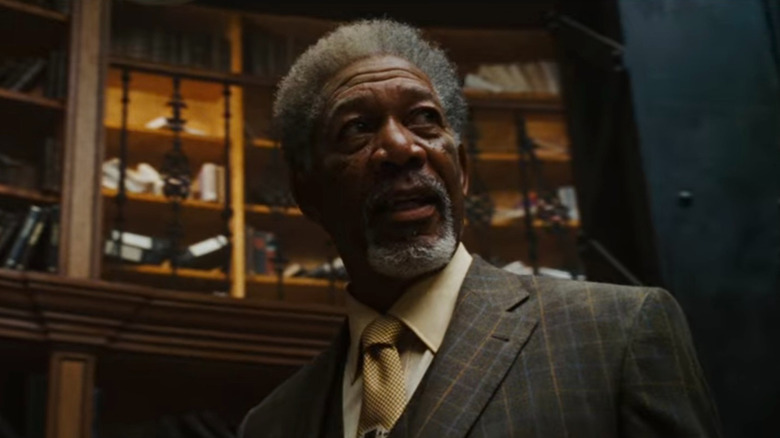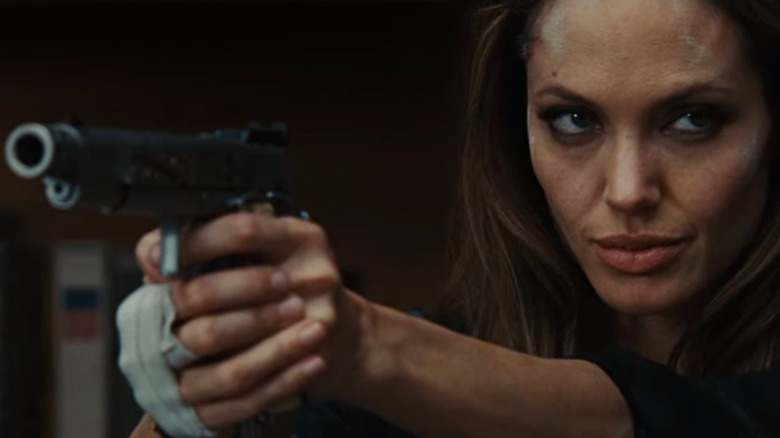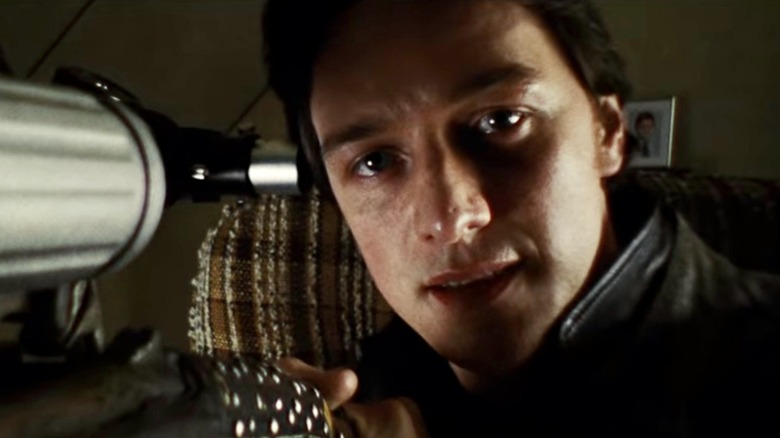Wanted Ending Explained: What Have You Done Lately?
Spoilers follow for the ending of "Wanted."
Few movies can claim to end with a character cursing directly at the camera, but "Wanted" fits the bill. This is that other Morgan Freeman comic book movie from the summer of 2008. "Wanted" hit theaters three weeks before "The Dark Knight," and some of its cast members — James McAvoy, Angelina Jolie, and Chris Pratt — would go on to star in Marvel movies in the years to come. However, this film deviates from its comic book source material, jettisoning the supervillain aspect of the plot.
In the original six-issue "Wanted" miniseries by writer Mark Millar and artist J.G. Jones, protagonist Wesley Gibson was drawn to look like Eminem, and the secret society of the Fraternity did have a supervillain bent. Millar would return to the idea of villains taking over the world in his "Old Man Logan" story arc with Steve McNiven, which also began in the summer of 2008 and would later inspire Hugh Jackman's last outing as the X-Man Wolverine in the 2017 film "Logan."
Needle-dropping the Nine Inch Nails song "Every Day Is Exactly the Same," "Wanted" goes through the familiar motions of a zero-to-hero narrative, but director Timur Bekmambetov chose to focus more on assassins as a fictional stand-in for self-actualized people. The movie is a geek call to arms, but not in the sense of actually taking up arms. It goes without saying that "Wanted" and its gun-slinging are not meant to be taken literally. In the film, there's talk of Wesley, played by McAcoy, fulfilling his destiny, and when he breaks the fourth wall at the end and says, "What the f*** have you done lately?" all he and the screenwriters want to do is shake the viewer out of complacency or apathy in their own life.
A confrontational call to action
When we first meet Wesley in "Wanted," he's a loser working in a dreary office, with books about self-talk and getting out of debt on hand. Prescription pills help him fight back anxiety attacks while his boss harangues him and his girlfriend cheats on him with his "sack-of-s*** best friend" Barry (Chris Pratt). At the end of the movie, once Wesley has embraced his selfhood as an assassin, he describes his previous state of existence as "ordinary and pathetic, just like you."
This is obviously rather presumptuous and confrontational; it's not often you hear a film narrator talking down to the audience and insulting it. If "Wanted" were a more focus-grouped comic book movie, maybe that kind of sandpapery dialogue would be weeded out so as not to offend anyone. As it is, Wesley does provoke the viewer in a brazen fashion, daring them to prove him wrong and take control of their life, the way we see him doing as he turns his disability — the anxiety attacks — into a superpower. It turns out they allow him to slow time and get into the adrenaline-charged assassin zone.
Wesley assumes the audience is just like him. If not a call to arms, his final question to it is at least a call to action. Are you going to let this movie you've watched slither into the ether as another time-waster, a passive form of entertainment, or are you going to apply its lessons to your own life (even if you hated the movie and are doing it as an act of defiance because living well is the best form of revenge)? That's all Wesley is asking. At this point, he's life-coaching the audience the way Angelina Jolie's character, Fox, did with him when they first met.
Supervillain self-help
Undoubtedly, there's a wish-fulfillment aspect to "Wanted," in keeping with the "Hero of the Beach" tradition of comic book stories. It's not always easy to turn one's life around — and you won't often turn around in the grocery store to see that an alluring stranger has walked into your life and is now leaning on the counter, taking a special interest in you, telling you, "You apologize too much." Fox's piercing gaze, her swift mentorship of Wesley, and his parting voiceover, are more like seeds to be planted in one's internal monologue — images and words the viewer can think back on later and use as motivation in their own life.
It's supervillain self-help, though again, Wesley is not, strictly speaking, a villain like his comics forebear. Still, he is a budding executioner. Fox initiates him in the ways of the Fraternity, which uses the Loom of Fate to determine its assassination targets.
The only problem is the Fraternity, led by Morgan Freeman's character, Sloan, has become corrupt. Wesley finally learns that Cross (Thomas Kretschmann), the rogue Fraternity member chasing him through the movie, is his dad, "one of the greatest assassins who ever lived." Cross was trying to protect him from the Fraternity, and Wesley has become "a tool who was mind-f***** into killing his father."
After Wesley attacks their base, Sloan reveals to Fox, the Gunsmith (Common, who would again play a hit man in "John Wick: Chapter 2"), and the other assassins that their names started coming up in the Loom of Fate. Sloan began ignoring it and selecting his own targets, changing the course of history as he saw fit. As they all surround Wesley, he encourages them to "shoot this motherf*****" and take the Fraternity "to heights reserved only for the gods of men."
What you've always wanted
Fox is a true believer, so she instead turns her gun on the boys of the Fraternity, curving the bullet to take them all out, followed by herself, and leaving Wesley alone again with an empty bank account. The patriarchal Sloan escapes and shows up at Wesley's office, and the camera takes on his point-of-view as he creeps up on Wesley from behind. Yet "Wanted" is only doing a quick fake-out ...
Miraculously, there are still no Google search results for "Wesley Gibson," despite it being a fairly generic name. Wesley uses the anonymity to his advantage. He's actually two steps ahead of Sloan and is using a decoy to make Sloan think he's gone back to his old unfulfilling life in his cubicle — when in fact, he has fully come into his own as an assassin, perched inside a window across town with a sniper rifle.
#DoNotTryThisAtHome. If there are any criticisms to be made of "Wanted," it's that it caters to a certain man-boy perspective, is nakedly derivative of movies like "The Matrix" and "Fight Club," and could likewise be misinterpreted by self-entitled bros who are more like Barry than Wesley. To be clear: Wesley inhabits a comic book hyper-reality where violence has no consequence and he can follow in his father's footsteps and save the world. Real life is less exciting and dramatic and far more complicated. It's not advisable to pick up a weapon or become a bad guy, but it is advisable to stop floundering and do something productive with one's life beyond consuming comic book movies.
Wesley figures out who he is and what he's always wanted out of life — hence the movie's title, "Wanted" — and now the onus is on the viewer to go and do the same.



